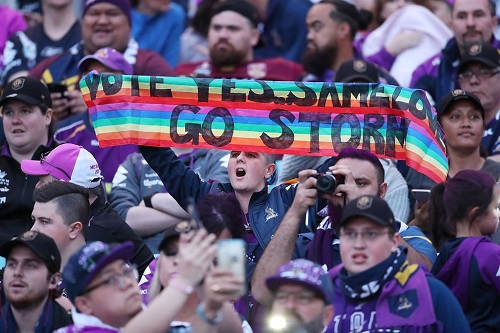AFP photo
By
Binoy Kampmark
One cultivated myth of human endeavour is the creaky and far from convincing idea that politics and sport are strangers, gazing indifferently from distant across tables, never to engage. Battles on the field can be waged without politics, while politics excludes sport with allergic vigour.
The pretence leads to curious spectacles. It means that the International Olympic Committee can be wooed by a ruthless, canny dictator who ultimately plunges a good portion of the globe into conflict. (Mr Hitler, they were assured, was really a true Olympian at heart, and not prone to fanatical anti-Semitic beliefs).
From another perspective, it means that anti-apartheid protests had no merit in disrupting touring South African sides in either cricket or rugby during the 1960s and 1970s. The South African players were apolitical, as former conservative Prime Minister John Howard less than candidly explained, and should be spared the ugliness of conscience. Boycotts should be reserved for other, weightier matters.
Australian Rugby, most specifically Sunday’s Grand Final, has now found its way into this curious mix, or, as the invited Seattle rapper Macklemore puts it, “kind of the Super Bowl of their rugby league.”
Macklemore’s invitation by the National Rugby League (NRL) to perform on the occasion has become more than a mere issue of light entertainment. On his slate of promised songs to be performed before the sporting spectators was “Same Love”.
The result was bemusing: the invited artist had been receiving tweets from “angry old white dudes in Australia” and became the subject of a petition seeking to prevent the performance from taking place.
With yawn-inducing predictability, former Australian Prime Minister, Tony Abbott, was one such dude off the political mark. To let the American artist perform on one of Australia’s biggest sporting stages was one thing; to let him run a show with a song on same-sex marriage, quite another. “Footy fans shouldn’t be subjected to a politicised grand final. Sport is sport!”[1]
This fascinatingly constipated position is also intoned by the funereal Senator Eric Abetz from Tasmania, who assumes that the campaign against same-sex marriage is facing unnecessary obstacles put in play by the devils of the Yes campaign. Even Abetz makes Abbott seem moderate on occasion, fearing that Australia’s children are threatened by a “radical gay education”.
Conservative scribblers such as Miranda Devine thought the invitation a poorer reflection on the part of Australia’s sport administrators. Never mind Macklemore; it was the seedy politics of the whole thing.
“The problem is the timing. The National Rugby League has deliberately inserted itself into a divisive political debate by inviting Macklemore to play a song he wrote specifically in 2012 to sway the same-sex marriage campaign in the US state of Washington.”
For Devine, Macklemore’s work became the “anthem for same-sex marriage in the US.” The performer, in other words, was insinuating himself into the Australian debate, his work being used as a fashioned weapon for a cause.
The NRL chief, Todd Greenberg, had effectively co-opted “80,000 fans in ANZ stadium unwittingly to participate in a massive propaganda exercise for the Yes campaign that will be televised to almost four million viewers.”
Former NRL player, Tony Wall, is of similar mind on these fifth column tactics, and has given much time in a vain effort to convince Greenberg to remove “LGBTIQ politics out of the NRL.” Wall would find it “very difficult to watch the NRL Grand Final with my wife and five young children as the event will be heavily politicised with a LGBTIQ anthem taking centre stage.”[2] So much for the love.
Coalition government ministers also found their way into the spat. Most surprisingly of all was the stance from the not always sensible Australian Attorney-General, George Brandis. “This particular song,” he explained to ABC News Breakfast, “is one of the four songs, I believe, that Macklemore is singing.” It was popular, catchy, and “for Mr Abbott or anyone else to say that it should be banned I think is a bizarre thing to say.”[3]
Australia’s same-sex campaign is getting uglier, with resentments crackling, suspicions blazing. It has wound its way into sports, as it was bound to. It has mobilised groups, businesses and institutions to throw in their lot with the cause. It has sharpened the No position, which is, at points, losing its appeal. Even more fundamentally, it will make absolutely no difference to those whose minds are resolutely made up, where the debate is but a pantomime to conceal the obvious.
What this particular squib of insignificance has thrown up is the old illusion, some might even say delusion, that the sporting classes do not mix with the political. It has prompted Malcolm Knox to press for a deal: take politics out of sport, but remove the politician from the sporting arena.
“No more serving prime ministers up on the podium to hand out the trophy. No more ex-prime ministers in the Cricket Australia box.” Perhaps even more pointedly, “No more pollies having beers at the footy.”[4]
Binoy Kampmark
Dr. Binoy Kampmark was a Commonwealth Scholar at Selwyn College, Cambridge. He lectures at RMIT University, Melbourne. Email: [email protected].
[1] https://twitter.com/TonyAbbottMHR/status/912900163991162880
[2] http://www.sbs.com.au/news/article/2017/09/28/brandis-hits-out-abbott-opposing-macklemores-pro-same-sex-marriage-song-nrl-final
[3] http://www.abc.net.au/news/2017-09-28/ssm-macklemore-nrl-grannd-final-abbott-brandis/8995490
[4] http://www.smh.com.au/sport/sport-and-politics-whatever-its-all-about-life-20170929-gyr5mg.html



No Comments Yet!
You can be first to comment this post!